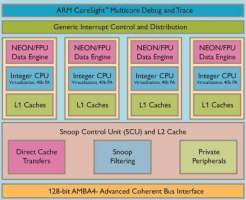Progress on ARM versions of Fedora and openSUSE

![]() The Cortex-A7 as a quad-core
The Cortex-A7 as a quad-core
Source: ARM
According to an email from openSUSE developer Andrew Wafaa, a group of openSUSE developers are working on implementing full support for ARM processor cores in version 12.2 of the distribution, due to be released in July. The email summarises the key points from, and results of, a discussion between developers interested in an ARM port. The plan is to focus on support for ARMv7 architecture used in the current generation of Cortex processors, but the emails also says that if anyone is really interested in improving support for ARMv5, they should "get stuck in".
According to Wafaa, for 12.2 to be able to support ARM architectures, all outstanding problems arising when compiling software for ARM cores in the Factory developer tree need to be resolved by June 1st at the latest. The email specifies the Pandaboard, which is equipped with an OMAP4 processor with two Cortex-A9 cores, as a reference platform, but notes that the ARM port of openSUSE should also be able to run on other devices.
Meanwhile, Fedora Project developers had been planning to launch a Fedora 14 remix specially configured for the low cost Raspberry Pi tiny computer on Wednesday. This has, however, had to be put back a few days due to health problems suffered by the lead developer. The Raspberry Pi developers intend to recommend the distribution to users purchasing the $35 tiny computer. The Raspberry Pi has an ARM11 core which uses the older ARMv6 architecture. The Fedora remix has been largely developed at Seneca College in Toronto. The developers involved give some background information on how the remix came about in this video:
Video on the genesis of the Fedora remix for the Raspberry Pi.
The Fedora Project stopped maintaining Fedora 14 back in December; the ARM port of Fedora 15 is marked as "Complete". As with the ports for PowerPC and s390x, to avoid getting in the way of work on the primary x86-32/x86 and x86-64/x64 architectures, the ARM port is currently classed as a "secondary architecture". Fedora's ARM developers are, however, mulling over working to elevate the ARM port to the status of primary architecture in Fedora 18.
(djwm)
![Kernel Log: Coming in 3.10 (Part 3) [--] Infrastructure](/imgs/43/1/0/4/2/6/7/2/comingin310_4_kicker-4977194bfb0de0d7.png)

![Kernel Log: Coming in 3.10 (Part 3) [--] Infrastructure](/imgs/43/1/0/4/2/3/2/3/comingin310_3_kicker-151cd7b9e9660f05.png)
















